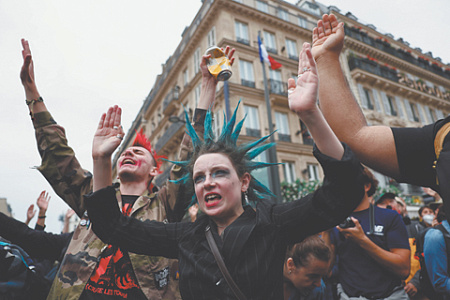
France is plunging deeper into a political crisis as the appointment of a new prime minister, Sébastien Lecornu, has been met with mass nationwide protests. On the day Lecornu, a close ally of President Emmanuel Macron, took office, demonstrators mobilized under the slogan “Bloquons tout” (“Block Everything”), signaling widespread public discontent with the government’s economic policies and Macron’s overall political direction.
The protest movement, drawing thousands to the streets across the country, is a disparate coalition of citizens from across the political spectrum, from anarchists to the far-right. Originating from a call on TikTok for “peaceful resistance,” the demonstrations in some cities turned violent, with fierce clashes between police and protesters in Paris, leading to property damage and hundreds of arrests. The movement’s lack of a clear set of demands, united only by a general opposition to Macron, has drawn comparisons to the disruptive “Yellow Vests” (Gilets Jaunes) protests that shook France in 2018.
Sébastien Lecornu’s appointment is seen by many as a continuation, not a change, of the current administration’s policies. A staunch Macron loyalist who has served in every government since 2017, his most recent tenure was as Minister of Defence. In that role, he championed a major military rearmament program set for completion by 2030, which he justified by citing a threat from Russia. His long-standing political alliance with the president reinforces the public perception that he will follow Macron’s agenda closely.
The political opposition has been swift to condemn the appointment. Marine Le Pen, the informal leader of the far-right National Rally, accused Macron of “locking himself in a narrow circle of loyalists” and predicted that inevitable snap elections would see her party’s president, Jordan Bardella, become the next prime minister. This sentiment was echoed by the far-left leader Jean-Luc Mélenchon, who called for Macron’s resignation, and by the Socialist party, creating a rare unified front of opposition in parliament.
Lecornu faces the monumental task of navigating a hostile parliament to pass a difficult budget featuring harsh austerity measures. According to political analyst Sergey Fedorov of the Institute of Europe RAS, the new prime minister must find a way to build a dialogue between “three irreconcilable blocs”—the far-right, the left, and Macron’s centrists—all of whom oppose the spending cuts needed to address France’s national debt, which has ballooned to 114% of GDP.
Failure to secure a compromise could force President Macron into a corner, potentially compelling him to dissolve the lower house of parliament and call for snap elections. However, current polls suggest such an election would likely result in a victory for the far-right National Rally, an outcome Macron is determined to avoid. This political stalemate has ignited concerns about a systemic crisis of France’s Fifth Republic, as its institutions appear unable to solve the nation’s profound challenges, with no clear consensus on a path to reform.
